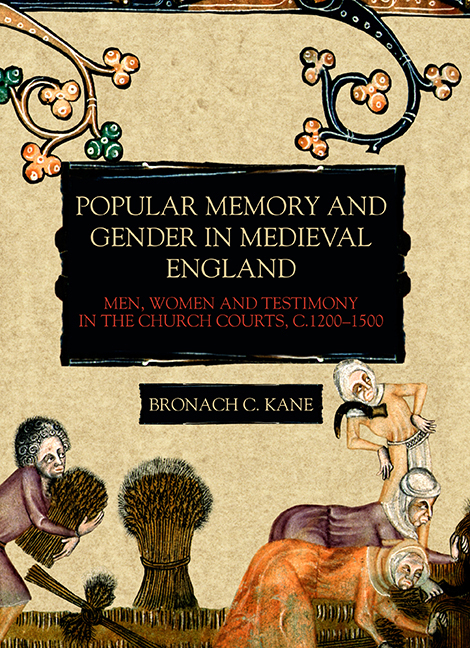 Popular Memory and Gender in Medieval England
Popular Memory and Gender in Medieval England Book contents
- Frontmatter
- Dedication
- CONTENTS
- List of Abbreviations
- Introduction
- Chapter 1 Pastoral Care, Canon Law, and Social Relations
- Chapter 2 Gender, Narrative, and Testimony
- Chapter 3 Bodily Practices
- Chapter 4 Sexuality and Generation
- Chapter 5 Marriage, Kinship, and Widowhood
- Chapter 6 Orality, Written Memory, and Custom
- Chapter 7 Place, Landscape, and Gender
- Conclusion
- Bibliography
- Acknowledgements
- Index
- Gender in the Middle Ages
Chapter 6 - Orality, Written Memory, and Custom
Published online by Cambridge University Press: 03 September 2019
- Frontmatter
- Dedication
- CONTENTS
- List of Abbreviations
- Introduction
- Chapter 1 Pastoral Care, Canon Law, and Social Relations
- Chapter 2 Gender, Narrative, and Testimony
- Chapter 3 Bodily Practices
- Chapter 4 Sexuality and Generation
- Chapter 5 Marriage, Kinship, and Widowhood
- Chapter 6 Orality, Written Memory, and Custom
- Chapter 7 Place, Landscape, and Gender
- Conclusion
- Bibliography
- Acknowledgements
- Index
- Gender in the Middle Ages
Summary
Memories of custom and legal experience were imbued with gendered meaning in later medieval England. In social practice and in the courts, men and women engaged with local histories in ways that exemplified their relationship to the land and to the wider community. The remembrance of custom and rights arose from the coalescence of legal statements and more popular accounts of the past, communicated primarily through male testimony. In a late fifteenth-century dispute from Yorkshire over parochial rights, all forty-three witnesses from Kirkham Roo were men, producing a uniformly male version of parish history that was constituted by excluding others. Women of the village were thus absent from many formal versions of parish and manorial histories. Men's memories of local custom often omitted the role and agency of female neighbours and kin, due to ingrained perceptions of women's authority that encouraged their elision from legal accounts of the past.
Although greater formal significance was ascribed to men's evidence, women nevertheless contributed to the formation of parish and village pasts, by participating regularly in agrarian and communal practices that were conveyed across the generations. Personal experience operated alongside the remembrance of custom, gradually developing into a form of cultural memory that was passed down over generations. Male witnesses occasionally remembered local events and customs that were transmitted in accounts from mothers, aunts, and grandmothers as well as kinsmen. References to female relatives underlined the extent to which histories were recounted in mixed-sex family settings where women's memories were granted considerable authority even when men's stories were accorded more worth in the courts. Like other areas of memory, local histories of this kind were not straightforward accounts of past events, but were instead subjective interpretations of shared and collective histories, conveying elements of litigants’ and witnesses’ identities as well as the interests of sections of their community.
Memory provided the foundations for several key features of manorial and parish society. The church building itself was the site in which Christ's Passion was re-enacted at the altar during Mass, and his life was recalled in the festive cycles of the liturgical calendar. This culture of remembrance extended to the commemoration of the dead, who were remembered through their association with various objects, rituals, and places.
- Type
- Chapter
- Information
- Popular Memory and Gender in Medieval EnglandMen, Women, and Testimony in the Church Courts, c.1200–1500, pp. 171 - 210Publisher: Boydell & BrewerPrint publication year: 2019


